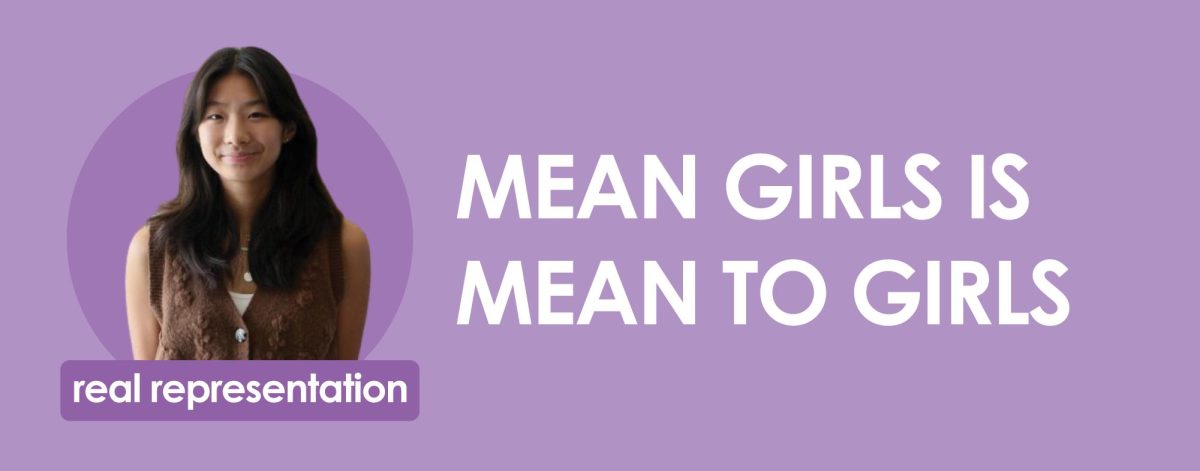Every Oct. 3, there are countless videos and posts for “Mean Girls Day.” There are people all over the internet who treat this day like a holiday. But the first time I watched “Mean Girls,” I was appalled at the sheer ignorance of the movie. With all the slurs, body-shaming and toxicity—how could anyone say this was their favorite movie? The general consensus on the movie was far from what I’d expected. Most people loved the movie and were quick to praise it; in fact, the movie earned an 84% Rotten Tomatoes score.
However, what surprised me even more was the number of teenage girls praising the movie. Considering that “Mean Girls” blatantly promotes unrealistic standards and unhealthy relationships between women, there is a shocking amount of teenage girls who still put this movie on a pedestal. When questioned about the more problematic aspects of the movie, most people are dismissive. They say it was a different time, or that it’s funny regardless, but above all, the movie is extremely harmful to young girls. Sure, it was a different time, and many parts of the movie did make me laugh, but it also showed me how awful women can be toward each other.
“Mean Girls” follows Cady Heron, a new girl who gets roped into Regina George’s coveted clique, the Plastics. The other Plastics are Karen Smith, the classic dumb blonde, and Gretchen Wieners, the unrelenting gossip, and though the stereotypical portrayal of these characters makes for a good laugh, their lives are tacky and clearly curated for the screen. The three girls are all skinny, white and rich—three attributes that are simply unattainable for most. Though it seems like a minute detail, the fact that the three most popular girls at this fictional high school are skinny, white and rich suggests that in order to be liked, you must also be skinny, white and rich. In fact, this very sentiment is echoed in the movie. As Regina gets tricked into gaining weight, she loses popularity, which all but screams “your worth directly correlates with your weight.” I know myself, and I know that most teenage girls think the same. It’s easy for us to pick up the little details in movies and retain them forever, to the point where we’re constantly comparing ourselves to fictional characters and judging our self-worth based on how similar or not we are to them. This kind of mindset distorts what our goals should really be and leaves us scrambling to catch up to “perfect” girls that aren’t even real.
Furthermore, Regina, Karen, and Gretchen spend most of their time together trash-talking other girls or plotting to ruin the life of someone who has literally never done anything to them. They thrive off of other women’s pain, and they never regret it. They have an entire “Burn Book” dedicated to ripping women who have “wronged” them to shreds. Most of these women’s offenses are along the lines of “she looked at me funny.” I’m not claiming to be innocent of making bad comments about people who have done small things to offend me, but the level to which the Plastics take their anger to is astounding.
They fat-shame the people they don’t like, they call their former friends homophobic slurs, and they even make stories up about their teachers. The girls have very little respect for their peers, and even Cady, who was hesitant to participate in Plastics™ activities, joins in eventually.
No matter how “funny” the movie intends to be, and no matter what excuse its fans come up with, “Mean Girls” only promotes impractical standards and unhealthy dynamics between young women. The countless teenage girls who watch the movie or see clips of the movie through social media take in these standards and the dynamic between the Plastics and view it as “normal.” The way women interact in the real world is greatly shaped by these dynamics, and it is anything but productive. The “Mean Girls” genre fully encourages young women to work towards looking, eating, acting, and treating other women in a very specific way. In fact, the implication is that the only way to popularity is by following this specific path.
Of course, there’s no way to completely stop women from comparing themselves to one another or from tearing other women down, but by leaving movies like “Mean Girls” in the past, we as women can find a more empowering, healthy dynamic between each other. In a world where women are consistently brought down by men, it is simply unsustainable to have women bring down other women.
The views in this column do not necessarily reflect the views of the HiLite staff. Reach Emma Hu at ehu@hilite.org.

































![AI in films like "The Brutalist" is convenient, but shouldn’t take priority [opinion]](https://hilite.org/wp-content/uploads/2025/02/catherine-cover-1200x471.jpg)









































![Review: “The Immortal Soul Salvage Yard:” A criminally underrated poetry collection [MUSE]](https://hilite.org/wp-content/uploads/2025/03/71cju6TvqmL._AC_UF10001000_QL80_.jpg)
![Review: "Dog Man" is Unapologetically Chaotic [MUSE]](https://hilite.org/wp-content/uploads/2025/03/dogman-1200x700.jpg)
![Review: "Ne Zha 2": The WeChat family reunion I didn’t know I needed [MUSE]](https://hilite.org/wp-content/uploads/2025/03/unnamed-4.png)
![Review in Print: Maripaz Villar brings a delightfully unique style to the world of WEBTOON [MUSE]](https://hilite.org/wp-content/uploads/2023/12/maripazcover-1200x960.jpg)
![Review: “The Sword of Kaigen” is a masterpiece [MUSE]](https://hilite.org/wp-content/uploads/2023/11/Screenshot-2023-11-26-201051.png)
![Review: Gateron Oil Kings, great linear switches, okay price [MUSE]](https://hilite.org/wp-content/uploads/2023/11/Screenshot-2023-11-26-200553.png)
![Review: “A Haunting in Venice” is a significant improvement from other Agatha Christie adaptations [MUSE]](https://hilite.org/wp-content/uploads/2023/11/e7ee2938a6d422669771bce6d8088521.jpg)
![Review: A Thanksgiving story from elementary school, still just as interesting [MUSE]](https://hilite.org/wp-content/uploads/2023/11/Screenshot-2023-11-26-195514-987x1200.png)
![Review: "When I Fly Towards You", cute, uplifting youth drama [MUSE]](https://hilite.org/wp-content/uploads/2023/09/When-I-Fly-Towards-You-Chinese-drama.png)
![Postcards from Muse: Hawaii Travel Diary [MUSE]](https://hilite.org/wp-content/uploads/2023/09/My-project-1-1200x1200.jpg)
![Review: "Ladybug & Cat Noir: The Movie," departure from original show [MUSE]](https://hilite.org/wp-content/uploads/2023/09/Ladybug__Cat_Noir_-_The_Movie_poster.jpg)
![Review in Print: "Hidden Love" is the cute, uplifting drama everyone needs [MUSE]](https://hilite.org/wp-content/uploads/2023/09/hiddenlovecover-e1693597208225-1030x1200.png)
![Review in Print: "Heartstopper" is the heartwarming queer romance we all need [MUSE]](https://hilite.org/wp-content/uploads/2023/08/museheartstoppercover-1200x654.png)




